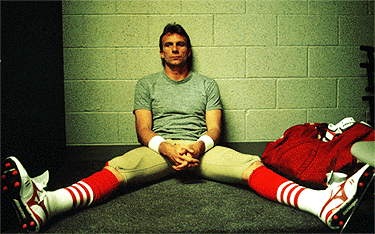The Best Ever? The story of 'Joe Cool'
2000 Enshrinee: Joe Montana
Page Two
Joe's final game for Notre Dame was the 1979 Cotton Bowl against the University of Houston. In a now famous performance, the slender sometime-starter, electrified a national audience as he directed the Fighting Irish back from a 34-12 deficit, midway through the fourth quarter, to a 35-34 win.
Pro scouts, however, were still skeptical. They questioned Montana's arm strength and his overall durability. As a result he wasn't selected until the third round of the 1979 National Football League draft. Three quarterbacks, Jack Thompson, Phil Simms, and Steve Fuller were selected before him.
"The minute I saw Joe move, there was no question in my mind that he was the best I'd seen," former 49ers head coach Bill Walsh said referring to Montana's pre-draft workout. "I knew with the offense I planned to run, Joe would be great."
 |
|
Just another day at the office |
Walsh's offense emphasized short or middle passes, multiple formations, and motions. It was a complicated system, one that required a disciplined disciple to implement. Walsh knew that his prize rookie was up to the task, but was careful not to ruin his confidence by subjecting the young quarterback to untenable circumstances. When Montana did play in his rookie season and early in his second, it was in carefully selected situations. "We didn't want to throw him to the wolves," Walsh said. "We thought it was important to give him moments of success early, to build his confidence." Midway through his second season, Walsh made the move and designated Joe the regular starter. He played well; completing 176 passes for 1,795 yards and 15 touchdowns. But it was only a small prelude of the successes that were to follow.
Montana once credited "seventy percent" of his success in football to the Walsh-style offense. "The system gives quarterbacks a lot more options, a lot of places to put the ball," he explained. "And when there's a blitz, it's a lot easier to overcome, probably, than in any other system."
In Montana's third year, the 49ers shocked the pro football world by going 13-3, defeating the Cowboys in the NFC championship game and advancing to Super Bowl XVI.
Montana played brilliantly in the Super Bowl. The first time the 49er offense got the ball they scored, going 68 yards. Montana threw on five of the first six plays and capped off the drive with a quarterback sneak for the game's first score. A second quarter 92-yard march resulted in another San Francisco score and a 14-0 lead. Two more drives resulted in two field goals and a 20-0 halftime score. "Our drives in the first half of that Super Bowl were comparable to the drive against Dallas," said Walsh. "Joe was letter-perfect." Although the Bengals mounted a comeback of their own, the 49ers went on to win 26-21 and Joe Montana captured the first of his record three Super Bowl MVP honors.
From 1981, Montana's first full season as a starter, through 1990, his last with the team, the 49ers finished first in their division except in the 1982 strike-shortened season, when they finished 11th overall, and in 1985, when they finished in second place. San Francisco was the team of the decade and Joe Montana was the principal reason why.
In 1984, the 49ers fell a few points short of the greatest season in NFL history. That year, behind Montana's cool, methodical play, the 49ers posted a near perfect 15-1 regular-season record. Their sole deprivation came mid-season, a 20-17 loss to the Pittsburgh Steelers. After convincing wins over the New York Giants and the Chicago Bears in the playoffs, Montana and company faced the Dan Marino-led 14-2 Miami Dolphins in Super Bowl XIX.
Two Western Pennsylvania quarterbacks, Montana and Marino, were pitted against each other in a game in which the hype clearly favored Marino. But when the smoke from the game-ending gun cleared, it was Montana who was surrounded by the media. Named the game's MVP for a second time, Joe completed 24 of 35 passes for a then-Super Bowl record 331 yards and three touchdowns. He also added 59 yards on the ground as the Niners defeated Miami 38-16. An exuberant Walsh proclaimed, "Joe Montana is the greatest quarterback today, maybe the greatest quarterback of all time."
Each of the next three seasons, the 49ers advanced to postseason play only to lose in the first round of the playoffs. Montana, however, emerged as the absolute model of consistency. His unflappable poise in the clutch frustrated opposing players and coaches, while amazing his legions of fans.
A humorous example of his poise under pressure occurred in Super Bowl XXIII against the Cincinnati Bengals. Trailing 16-13 with 3:20 left in the game, the 49ers had the ball on their own eight-yard line.
"Some of the guys seemed more than normally tense," Montana recalled, "especially Harris Barton, a great offensive tackle who has a tendency to get nervous." As usual, Montana was just focusing on the situation, how far they had to go and how much time was left. Just then he happened to spot the late actor John Candy in the stands. "Look" he said, 'isn't that John Candy." It was hardly what his teammates expected to hear in the huddle with the Super Bowl on the line. But it definitely broke the tension. "Everybody kind of smiled, and even Harris relaxed, and then we all concentrated on the job we had to do."